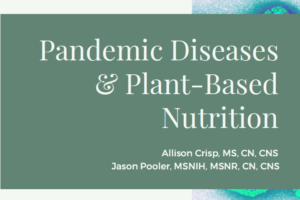Thanks for returning to my series on #flattenthecurve. If you are new please be sure to check out my first post about flattening the curve of COVID-19, my follow up where I discussed Vitamin C or D, and my third post centering on zinc and the spice turmeric. Today I will continue the discussion by moving on to elderberry, garlic, and Echinacea.
Elderberry
Like many of the nutrients being discussed in this series, elderberry has some evidence to consider in the fight to keep ourselves healthy and prevent the spread of COVID-19. Two articles have shown that elderberry extract, via elderberry flavonoids, can inhibit the replication of flu viruses in vitro at a rate that is comparable to Tamiflu.1,2 What this research doesn’t tell us is how much of an impact this will have in a human and how much of an impact it will have in a person who is otherwise healthy. As you may have seen already there are a variety of small studies of short duration on elderberry and elderberry extract. It’s important to note that most of these studies were performed by supplement companies and thus are plagued by known conflicts of interest that may downplay negative results. Despite this, there are some other studies worth mentioning. One study was performed in Norway on 60 men and women between the ages of 18-55.3 The age is important here as this age group is in the lower risk category for COVID-19, so please keep that in mind. This Norwegian study had participants take three teaspoons four times a day of an elderberry formula called Sambucol one day after symptoms arose.3 Those who took the Sambucol had significant reduction in aches and pains, cough, and congestion versus placebo.3 Despite this, recovery remained the same between the intervention and placebo groups. Another study, this time in Australia, found that elderberry had some usefulness in preventing colds/cold symptoms while traveling.4 This study of 312 men and women had participants take capsules of elderberry extract (300mg of elderberry extract at 22% polyphenols and 15% anthocyanins) daily for two to ten days before traveling overseas via plane.4 This study did not show elderberry to be any better than placebo for preventing colds while traveling but it did show that those who took elderberry had reduced duration and severity.4 Like I mentioned above, this study is one of many that was funded by the manufacturer of the extra used in the study and thus is questionable at best. So far, no studies that have been through the peer review process show any benefit of using elderberry for COVID-19. For normal flus and colds, I’m all for using elderberry but then it comes to using elderberry for suspected COVID-19 infection, there is actually some potential risk to consider.
The risk from using elderberry to treat COVID-19 may be due to a proposed increased risk of what is called a “cytokine storm.” A cytokine storm is a fancy name for a systemic inflammatory response that can be triggered by supplements, drugs, or infections. This happens when immune cells get stuck in a loop where they call upon more and more help by other immune cells but never get the message out that they have enough. At some point in the body, the immune cells start to create more problems than they are solving as the immune cells activate the inflammatory response on overdrive. When this happens in the lungs it can be devastating to lung tissue which gets caught in the crossfire between an overactive immune response and the virus (in this case) that the immune system is trying to battle. A 2001 study showed that elderberry can increase inflammatory cytokines in the blood of healthy volunteers with increased inflammation occurring with increased dose.5 Some natural medicine physicians may actually try to promote this activity at low levels in relatively healthy people for the treatment of things like the cold or the flu as it can aid the immune response. So far there has been no research to verify if elderberry can trigger a cytokine storm. At moderate doses, elderberry is most likely safe for most people however, if you have a compromised immune system, an autoimmune disease, or cancer it’s best to consult your physician before starting or increasing your dose of elderberry. Another important consideration is that all the studies performed were done with a short duration and no research has looked at the long term implications of supplementing with elderberry for months on end. Based on a variety of social media messages I have seen, some may be supplementing or planning to do so while this outbreak lasts. There is no research to suggest this will be necessary or helpful.
Beyond the risk mentioned above, another concern with elderberry is limited to people with grass pollen allergies which can potentially be triggered by elderberry.6 Also, DO NOT consume uncooked or unripe elderberries as they contain toxins that can cause nausea, vomiting, diarrhea, weakness and dizziness.7 If you are going to use elderberries make sure to stick to supplements.
Garlic
In vitro studies have shown some potential to using garlic to inhibit the growth of some cold or flu viruses however, studies in humans are limited.8,9 One double blind and randomized controlled trial of 146 men and women found 180mg of allicin powder (the primary chemical in garlic thought to be responsible for many, if not most of garlic’s beneficial effects) taken in capsules daily for three months was able to reduce the number of colds verses the placebo group.10 While garlic may be able to reduce the number of colds, this mall study did not show that garlic, via allicin, was able to reduce the duration of a cold versus placebo. When it comes to garlic, my advice it to use it generously in cooking and consider saving your money on supplements…get used to garlic breath, but don’t waste your money on allicin supplements. The research above is not very convincing that a supplement of garlic is worth the costs, especially since raw garlic or garlic powder is so widely available and relatively cheap, the good news though is that garlic is extremely safe for most people and there is little risk of people going overboard with garlic.
Echinacea
Studies on Echinacea have shown mixed results. It is thought that part of the reason for the mixed results is that studies have used a variety of different parts of the plant at different doses. Other considerations are that, like many supplements, industry funding of studies clouds results and make some studies unreliable and biased. When this is the case, meta-analyses can shed some light. Luckily we have one to take a look at. A 2007 meta-analysis of 14 studies of Echinacea revealed that prophylactic use can lower the odds of developing a cold by 65%.11 When use is started at the first sign of symptoms, the odds of developing a cold increase as the odds of developing a cold only lower by 35% when compared to placebo.11 As of 4/02/2020, there have been no published peer reviewed trials in humans that show Echinacea will help to fight COVID-19. It appears that Echinacea, despite its wide use in a variety of herbal supplement and tea preparations, only has marginal benefits in fighting viruses. Despite all of this, Echinacea is generally recognized as safe and has minimal side effects in most people. Also, like many herbs used in teas, there are other reasons to use it for health that go beyond an ability to fight viruses. I wouldn’t work to avoid it, but I also wouldn’t go out of my way to purchase an Echinacea supplement or tea. Instead I would opt for a formulation of herbs and spices in a tea or supplement that can maximize the nutritional value and consider some other supplements I have discussed in previous parts of this series such as Vitamin C or D, and zinc.
References:
1. Zakay-Rones, Z., et al. (1995). Inhibition of Several Strains of Influenza Virus in Vitro and Reduction of Symptoms by an Elderberry Extract (Sambucus nigra L.) during an Outbreak of Influenza B Panama. The Journal of Alternative and Complementary Medicine, 1(4), 361–369. doi:10.1089/acm.1995.1.361
2. Roschek, B., Fink, R. C., McMichael, M. D., Li, D., & Alberte, R. S. (2009). Elderberry flavonoids bind to and prevent H1N1 infection in vitro. Phytochemistry, 70(10), 1255–1261. doi:10.1016/j.phytochem.2009.06.003
3. Zakay-Rones, Z., Thom, E., Wollan, T., & Wadstein, J. (2004). Randomized Study of the Efficacy and Safety of Oral Elderberry Extract in the Treatment of Influenza A and B Virus Infections. Journal of International Medical Research, 32(2), 132–140. doi:10.1177/147323000403200205
4. Tiralongo, E., Wee, S. S., & Lea, R. A. (2016). Elderberry Supplementation Reduces Cold Duration and Symptoms in Air-Travellers: A Randomized, Double-Blind Placebo-Controlled Clinical Trial. Nutrients, 8(4), 182. https://doi.org/10.3390/nu8040182
5. Barak, V., Halperin, T., Kalickman, I. (2001). The effect of Sambucol, a black elderberry-based, natural product, on the production of human cytokines: I. Inflammatory cytokines. Eur Cytokine Netw. Apr-Jun;12(2):290-6.
6. Forster-Waldl, E., et al. (2003). Type I allergy to elderberry (Sambucus nigra) is elicited by a 33.2 kDa allergen with significant homology to ribosomal inactivating proteins. Clinical Experimental Allergy, 33(12), 1703–1710. doi:10.1111/j.1365-2222.2003.01811.x
7. Senica, M., Stampar, F., Veberic, R., & Mikulic-Petkovsek, M. (2016). The higher the better? Differences in phenolics and cyanogenic glycosides in Sambucus nigra leaves, flowers and berries from different altitudes. Journal of the Science of Food and Agriculture, 97(8), 2623–2632. doi:10.1002/jsfa.8085
8. Tsai, Y., et al. (1985). Antiviral Properties of Garlic: In vitro Effects on Influenza B, Herpes Simplex and Coxsackie Viruses. Planta Medica, 51(05), 460–461. doi:10.1055/s-2007-969553
9. Weber, N., et al. (1992). In Vitro Virucidal Effects of Allium sativum (Garlic) Extract and Compounds. Planta Medica, 58(05), 417–423. doi:10.1055/s-2006-961504
10. Josling, P. (2001). Preventing the common cold with a garlic supplement: A double-blind, placebo-controlled survey. Advances in Therapy, 18(4), 189–193. doi:10.1007/bf02850113
11. Shah, S. A., et al. (2007). Evaluation of echinacea for the prevention and treatment of the common cold: a meta-analysis. The Lancet Infectious Diseases, 7(7), 473–480. doi:10.1016/s1473-3099(07)70160-3







